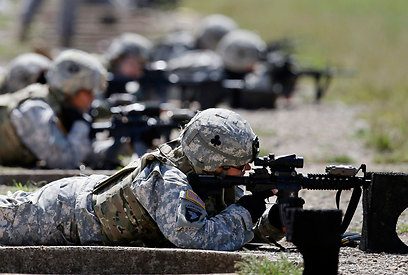
Pentagon unveils plans for moving women into combat roles
Pentagon unveils plans to integrate women in previously all-male combat infantry positions
The plans, which call for gender-neutral job requirements like scaling walls and lifting 55-pound (25-kg) tank ammunition, will require more years of study, education and training before some services open combat jobs to women.
Related stories:
- Hamas law promotes gender segregation
- Pentagon: Iranian plane pursued US spy drone
- Same length of service for men, women?
"I think the key is setting it up for success and making sure that they have time to do it right," said Juliet Beyler, director of Officer and Enlisted Personnel Management at the Pentagon.
The move to open combat jobs to women follows a dozen years of war in Iraq and Afghanistan, countries in which there were often no clearly defined front lines. More than 150 women have been killed in the wars, and nearly 1,000 wounded.

US female soldiers (Photo: AP)
It also comes as the Pentagon reels from a series of sexual assault scandals that have raised questions about the treatment of military women. The top US general has said exclusion of women from front-line combat may be part of the problem, consigning them to second-class status in a warrior culture.
Then-Defense Secretary Leon Panetta and Army General Martin Dempsey, the chairman of the Joint Chiefs of Staff, rescinded the rule barring women from direct combat jobs in January.
They gave the military services until May 15 to submit plans for implementing the decision, which could open 237,000 jobs to women in the US armed forces and expand opportunities for career advancement. Acceptance into the newly opened positions will be based on gender-neutral performance standards.
The services have to implement their integration plans by Jan. 1, 2016, and women could continue to be excluded from some jobs if the services submit a request for an exemption that is accepted by the
secretary.
Brains over brawn
Military leaders briefing reporters on the plans on Tuesday acknowledged that the services are changing and prefer brains over brawn in their elite fighting forces these days.
"The days of Rambo are over," said Major General Bennet Sacolick of the Special Operations Command. "We're looking for smart, qualified operators. There's a new dynamic ... We're looking for young men that can speak and learn a foreign language, understand culture, work with indigenous populations and (have) culturally tuned manners."
"The defining characteristic of our operators are intellect. And when people fail in the special forces qualification course, predominantly they fail because they're not doing their homework," he said.
Fully integrating women poses different challenges to different services. Fewer than 1 percent of Air Force jobs are still off-limits to women, while nearly a third of Marine Corps posts are closed.
US Special Operations Command appeared to have the greatest reservations about how to proceed with opening up.
"We don't deploy in large formations. I mean, we send a 12-man (team) ... into very austere, remote environments by themselves," Sacolick said. "That complicates integration, and that's our concern."
The preparations for integrating women into previously all-male units appeared to have as much to do with acceptance by the men as it did with physical performance by women.
"There is an understanding that ... the studies that they're talking about across all dimensions, not just physical, but exactly the behavioral, the social, the cultural, takes time to do," Beyler said.
- Receive Ynetnews updates directly to your desktop










